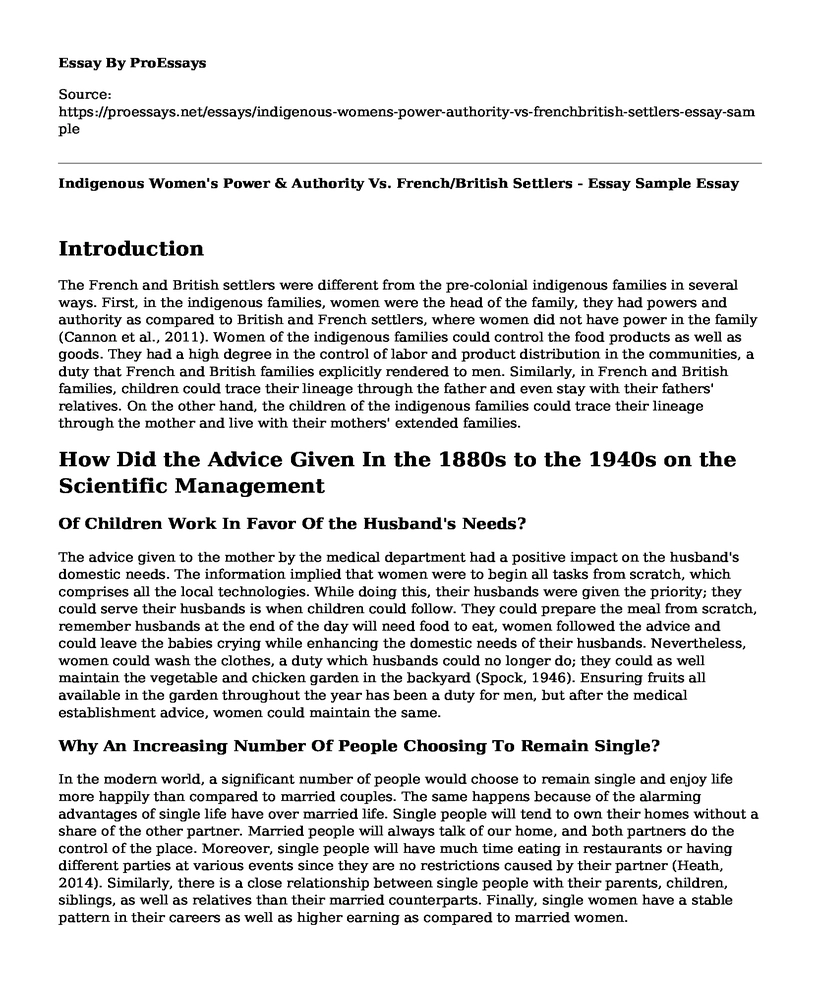Introduction
The French and British settlers were different from the pre-colonial indigenous families in several ways. First, in the indigenous families, women were the head of the family, they had powers and authority as compared to British and French settlers, where women did not have power in the family (Cannon et al., 2011). Women of the indigenous families could control the food products as well as goods. They had a high degree in the control of labor and product distribution in the communities, a duty that French and British families explicitly rendered to men. Similarly, in French and British families, children could trace their lineage through the father and even stay with their fathers' relatives. On the other hand, the children of the indigenous families could trace their lineage through the mother and live with their mothers' extended families.
How Did the Advice Given In the 1880s to the 1940s on the Scientific Management
Of Children Work In Favor Of the Husband's Needs?
The advice given to the mother by the medical department had a positive impact on the husband's domestic needs. The information implied that women were to begin all tasks from scratch, which comprises all the local technologies. While doing this, their husbands were given the priority; they could serve their husbands is when children could follow. They could prepare the meal from scratch, remember husbands at the end of the day will need food to eat, women followed the advice and could leave the babies crying while enhancing the domestic needs of their husbands. Nevertheless, women could wash the clothes, a duty which husbands could no longer do; they could as well maintain the vegetable and chicken garden in the backyard (Spock, 1946). Ensuring fruits all available in the garden throughout the year has been a duty for men, but after the medical establishment advice, women could maintain the same.
Why An Increasing Number Of People Choosing To Remain Single?
In the modern world, a significant number of people would choose to remain single and enjoy life more happily than compared to married couples. The same happens because of the alarming advantages of single life have over married life. Single people will tend to own their homes without a share of the other partner. Married people will always talk of our home, and both partners do the control of the place. Moreover, single people will have much time eating in restaurants or having different parties at various events since they are no restrictions caused by their partner (Heath, 2014). Similarly, there is a close relationship between single people with their parents, children, siblings, as well as relatives than their married counterparts. Finally, single women have a stable pattern in their careers as well as higher earning as compared to married women.
How Does Shared Family Income Disadvantage Women In Heterosexual Relationships?
In heterosexual relationships, women who work in the same job discerption as men tend to earn lower income as compared to that of the husband. The same happens due to the gender wage balance that minimizes women's salary. In some instances, couples' earnings get combined in one account, leading to men carelessly utilizing their income, leaving women with the family burden (Dunn & Skaggs, 2006). Women will pay for child care expenses, buying groceries, and even clothes for herself and children. However, men will spend money on alcohol, restaurant, gambling, and other luxurious costs.
References
Cannon, Martin and Lina Sunseri. (Eds.). (2011). Racism, Colonialism and Indigeneity in Canada: A Reader. Toronto, ON: Oxford University Press.
Dunn, D., & Skaggs, S. (2006). Gender and paid work in industrial nations. In Handbook of the Sociology of Gender (pp. 321-342). Springer, Boston, MA.
Heath, Melanie. [2014]. Intimacy Commitment and Family Formation. In David Cheal and Patrizia Albanese (eds.). Canadian Families Today. New Perspectives. Third Edition. Don Mils, ON: Oxford University Press, pp. 45-46.
Spock, B (1946). Baby and Child Care. New York, NY: Pocket Books.
Cite this page
Indigenous Women's Power & Authority Vs. French/British Settlers - Essay Sample. (2023, Jul 21). Retrieved from https://proessays.net/essays/indigenous-womens-power-authority-vs-frenchbritish-settlers-essay-sample
If you are the original author of this essay and no longer wish to have it published on the ProEssays website, please click below to request its removal:
- Family, Religion and The Zookeepers Wife
- Planned Parenthood Interest Group Essay
- Essay Sample on A Clean Street's a Happy Street
- Essay Example on Brothers' Fighting - Mama's Boiling Point!
- Essay Example on Navajo Diabetes: Assessing Health Needs in Remote Areas
- Cultural Diversity: Impact on Social Worker-Client Communication - Intentionality is Key - Essay Sample
- Essay Example on Jamaica's National Motto: Out of Many, One People







